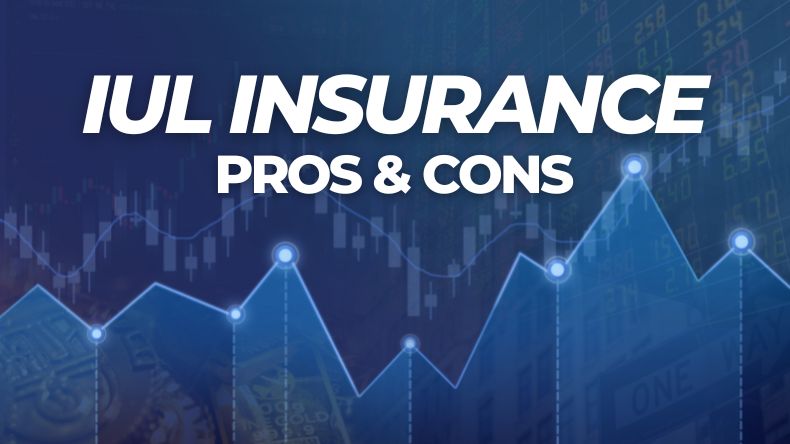All Categories
Featured
Table of Contents
Indexed Universal Life (IUL) insurance coverage is a kind of long-term life insurance coverage plan that incorporates the features of traditional universal life insurance policy with the capacity for cash money worth growth linked to the performance of a stock exchange index, such as the S&P 500 (Flexible premium IUL). Like other kinds of permanent life insurance coverage, IUL gives a survivor benefit that pays out to the recipients when the insured passes away
Cash money value accumulation: A section of the costs settlements goes right into a cash money value account, which makes rate of interest over time. This money worth can be accessed or borrowed against throughout the insurance holder's lifetime. Indexing option: IUL policies use the chance for cash worth growth based on the performance of a stock market index.
Who has the best customer service for Indexed Universal Life Investment?
As with all life insurance policy items, there is likewise a set of risks that insurance holders must recognize prior to considering this sort of policy: Market danger: Among the main threats connected with IUL is market danger. Since the cash worth development is linked to the efficiency of a stock exchange index, if the index chokes up, the money worth might not grow as expected.

Sufficient liquidity: Policyholders should have a secure financial circumstance and be comfortable with the exceptional repayment demands of the IUL plan. IUL enables versatile costs repayments within certain restrictions, however it's vital to maintain the policy to ensure it achieves its desired objectives. Passion in life insurance policy protection: People who require life insurance policy coverage and a rate of interest in money worth growth might find IUL attractive.
Prospects for IUL should be able to recognize the auto mechanics of the policy. IUL may not be the most effective alternative for individuals with a high tolerance for market danger, those that focus on inexpensive investments, or those with more immediate monetary demands. Consulting with a certified economic expert that can offer tailored advice is essential prior to taking into consideration an IUL policy.
All registrants will certainly receive a calendar invitation and link to sign up with the webinar via Zoom. Can not make it live? Register anyway and we'll send you a recording of the presentation the following day.
How long does Indexed Universal Life Calculator coverage last?
You can underpay or miss costs, plus you may be able to readjust your death advantage.
Cash money value, along with possible growth of that value with an equity index account. An alternative to allocate part of the cash value to a set passion option.
Policyholders can choose the portion designated to the taken care of and indexed accounts. The value of the selected index is recorded at the beginning of the month and compared with the worth at the end of the month. If the index increases throughout the month, rate of interest is included in the money value.
The 6% is increased by the cash money worth. The resulting rate of interest is included to the cash value. Some plans compute the index gets as the amount of the changes for the duration, while other policies take an average of the everyday gains for a month. No passion is attributed to the cash money account if the index drops rather than up.
What is Tax-advantaged Iul?
The rate is set by the insurance coverage business and can be anywhere from 25% to greater than 100%. (The insurance company can also change the take part price over the lifetime of the plan.) If the gain is 6%, the involvement rate is 50%, and the existing money value total is $10,000, $300 is added to the money value (6% x 50% x $10,000 = $300).
There are a number of advantages and disadvantages to consider before purchasing an IUL policy.: Similar to basic global life insurance policy, the insurance policy holder can raise their costs or lower them in times of hardship.: Amounts attributed to the cash money worth expand tax-deferred. The money worth can pay the insurance coverage costs, allowing the insurance holder to minimize or quit making out-of-pocket premium settlements.
What happens if I don’t have Iul Interest Crediting?
Several IUL policies have a later maturity day than other sorts of global life policies, with some finishing when the insured reaches age 121 or even more. If the insured is still active at that time, policies pay the survivor benefit (yet not normally the cash money worth) and the profits may be taxed.

: Smaller sized plan face values don't provide much benefit over normal UL insurance policies.: If the index goes down, no rate of interest is credited to the cash worth.
With IUL, the objective is to benefit from upward activities in the index.: Because the insurer just buys choices in an index, you're not directly purchased stocks, so you don't benefit when companies pay dividends to shareholders.: Insurers charge fees for handling your money, which can drain cash worth.
How do I cancel Indexed Universal Life Companies?

For most individuals, no, IUL isn't far better than a 401(k) - Long-term IUL benefits in regards to conserving for retirement. The majority of IULs are best for high-net-worth individuals looking for ways to reduce their gross income or those that have actually maxed out their various other retirement choices. For everyone else, a 401(k) is a better financial investment lorry due to the fact that it does not lug the high charges and premiums of an IUL, plus there is no cap on the quantity you may make (unlike with an IUL plan)
While you may not lose any kind of cash in the account if the index decreases, you will not earn interest. If the marketplace turns bullish, the incomes on your IUL will not be as high as a common investment account. The high cost of costs and fees makes IULs costly and considerably much less economical than term life.
Indexed universal life (IUL) insurance policy provides cash money value plus a fatality advantage. The money in the cash value account can make interest through tracking an equity index, and with some frequently alloted to a fixed-rate account. Nevertheless, Indexed universal life policies cap exactly how much cash you can accumulate (often at much less than 100%) and they are based on a potentially volatile equity index.
What is the best Iul Interest Crediting option?
A 401(k) is a better choice for that objective because it doesn't lug the high fees and premiums of an IUL policy, plus there is no cap on the quantity you may gain when invested. The majority of IUL policies are best for high-net-worth people seeking to reduce their gross income. Investopedia does not offer tax obligation, financial investment, or economic solutions and advice.
If you're taking into consideration buying an indexed universal life policy, first talk with an economic consultant that can discuss the subtleties and give you a precise photo of the actual potential of an IUL plan. Make sure you recognize how the insurance company will compute your rate of interest price, earnings cap, and costs that may be assessed.
Latest Posts
How Does Index Universal Life Insurance Work
Universal Insurance Near Me
Group Universal Life Cash Accumulation Fund